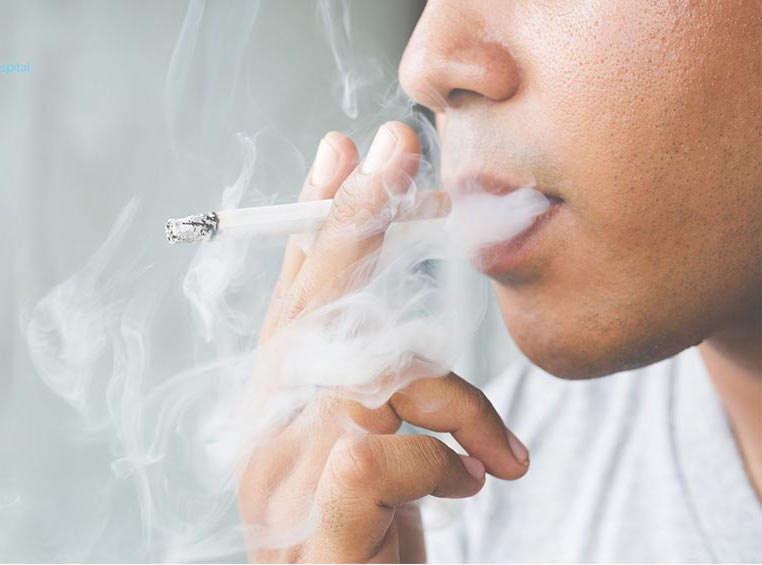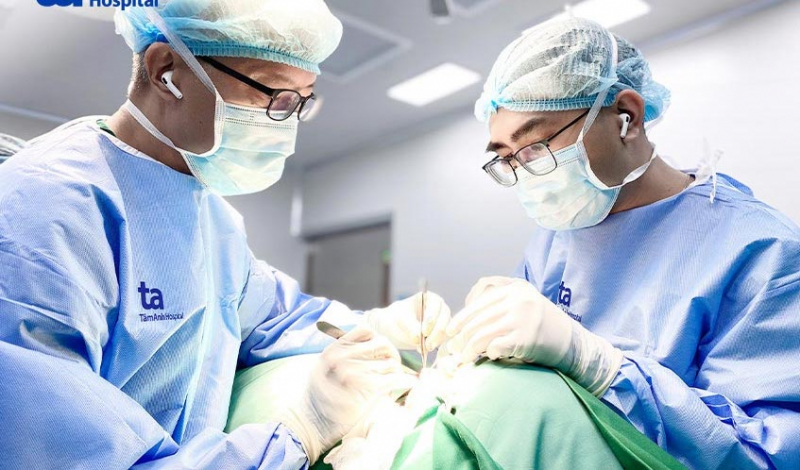Oral cancer after 40 years of smoking
Addicted to smoking for 40 years, Mr. TVH (67 years old, Binh Thuan ) smokes 10 cigarettes a day. Recently, he had a sore in his mouth that did not heal, so he went to the hospital for a check-up.

At the Head and Neck Unit, Tam Anh General Hospital , Ho Chi Minh City, doctors diagnosed him with oral cancer.
Mr. H had surgery to remove the entire tumor and remove the lymph nodes on his left neck. After surgery, his health improved.
He shared that a year before, there was a lump inside his left cheek, hard as a grain of sand. Six months later, the lump increased in size, the left cheek area ached dully, he had difficulty chewing food, thought it was a toothache but a dental examination found nothing unusual. Three months later, the lump appeared ulcerated, the mouth area was painful. He went to the pharmacy to buy medicine, the pain subsided but the ulcer did not heal so he went to the hospital.
He had a biopsy taken of the ulcer, which showed stage 3 squamous cell carcinoma, keratinization, invading the left cheek mucosa. After surgery to remove the left cheek mucosa cancer, Mr. H was prescribed additional radiation therapy to destroy the cancer cells and prevent the cancer from metastasizing.
Mr. H said he started smoking when he was 20. For more than 40 years, he smoked 10 cigarettes a day and only drank alcohol occasionally. During stressful times, he could smoke up to 15-20 cigarettes a day. For the past three years, due to diabetes and high blood pressure, he has smoked less.
Quit smoking to prevent oral cancer
Dr. Doan Minh Trong, Head and Neck Unit, Tam Anh General Hospital, Ho Chi Minh City, said that oral cancer is a condition in which the oral cavity forms malignant lesions in locations such as the tongue, mucosa, gums, floor of the mouth, palate (the septum between the nasal cavity and the oral cavity), and lips. In Southeast Asia, there are more than 180,000 cases of oral cancer each year, about 90% due to smoking habits. The disease occurs mainly in men over 50 years old.

The cause of oral cancer is still unknown, but there are some factors that increase the risk of the disease such as smoking, drinking alcohol, infection with human papillomavirus (HPV), Epstein-Barr virus (EBV), family members with oral cancer... Poor oral hygiene or gum disease also increases the possibility of developing malignant tumors in the mouth. Exposure to secondhand smoke, especially over a long period of time, can lead to oral cancer.
Smokers are 5-6 times more likely to develop oral cancer than non-smokers. The longer you smoke, the higher your risk of oral cancer. Smokers and drinkers are 30 times more likely to develop oral cancer than non-smokers or non-drinkers.
“As in Mr. H’s case, smoking a lot of cigarettes is one of the risk factors for this disease. Cigarettes contain more than 60 toxic substances: formaldehyde, arsenic, radioactive substances, hydrogen cyanide, benzene… These substances weaken the immune system and can cause DNA (gene) mutations leading to cancer. Cells in the mouth with damaged DNA can lead to cancer in this area,” Dr. Trong emphasized.
According to the World Cancer Organization, in 2022, there were 389,846 new cases of oral cancer and 188,438 deaths from this disease, with a mortality rate of nearly 50%. Patients may develop ulcers that are easily confused with canker sores. Meanwhile, canker sores are often concave in the middle, white or gray in color, with red or pink edges, painful but benign, usually healing within two weeks. Or a lump in the neck, bleeding in the mouth, loose teeth, swelling or pain in the lips that do not heal, difficulty swallowing, changes in voice, unexplained weight loss... can also be caused by oral cancer. Because the symptoms of oral cancer are often unclear, patients often discover the cancer when it is in a late stage.
Dr. Trong recommends that when the mouth area shows signs of tumors, red or white patches, ulcers that do not heal after 1-2 weeks, swollen jaw, prolonged mouth pain, difficulty swallowing, chewing, etc., you should see a specialist for examination, diagnosis and appropriate treatment.
Treatment for oral cancer depends on the type of cancer, its location, and how far it has spread. The most common treatment is surgery to remove the tumor. The extent of surgery may depend on the size of the tumor and how far the cancer has spread. The doctor may remove surrounding tissue and nearby lymph nodes. After surgery, depending on the condition, the doctor may prescribe chemotherapy or radiation therapy to prevent recurrence, metastasis, or to stop the disease from progressing.
Source: https://cand.com.vn/y-te/hut-thuoc-la-co-nguy-co-ung-thu-mieng-cao-gap-5-6-lan-i779086/







![[Photo] Prime Minister Pham Minh Chinh chairs the meeting of the Government Party Committee Standing Committee](https://vstatic.vietnam.vn/vietnam/resource/IMAGE/2025/8/23/8e94aa3d26424d1ab1528c3e4bbacc45)
![[Photo] General Secretary To Lam attends the 80th Anniversary of the Cultural Sector's Traditional Day](https://vstatic.vietnam.vn/vietnam/resource/IMAGE/2025/8/23/7a88e6b58502490aa153adf8f0eec2b2)






















































































Comment (0)